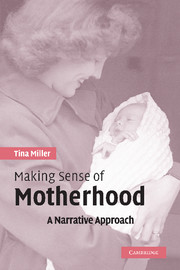Book contents
- Frontmatter
- Contents
- Dedication
- Acknowledgements
- Introduction
- 1 The storied human life: a narrative approach
- 2 Making sense of motherhood: cultural scripts
- 3 Setting the Western context: mothering in late-modern society
- 4 Anticipating motherhood: the antenatal period
- 5 Making sense of early mothering experiences
- 6 A return to normal: becoming the expert
- 7 Conclusions and reflections: making sense of motherhood
- References
- Index
3 - Setting the Western context: mothering in late-modern society
Published online by Cambridge University Press: 22 September 2009
- Frontmatter
- Contents
- Dedication
- Acknowledgements
- Introduction
- 1 The storied human life: a narrative approach
- 2 Making sense of motherhood: cultural scripts
- 3 Setting the Western context: mothering in late-modern society
- 4 Anticipating motherhood: the antenatal period
- 5 Making sense of early mothering experiences
- 6 A return to normal: becoming the expert
- 7 Conclusions and reflections: making sense of motherhood
- References
- Index
Summary
As was noted previously, childbirth is always more than a biological event. Within Western cultures this position has provided a powerful, shifting and contested context in which women come to understand and make sense of their experiences of becoming mothers and motherhood. Experiences of becoming and being mothers are inextricably linked to ‘race’, social class, age and socio-cultural location and as a result are diverse and fragmented. In contrast, dominant forms of knowledge and associated practices shape the context in which mothering occurs. These are largely based on notions of mothering as biologically determined, instinctive and therefore universally experienced. In this chapter the complex and changing contexts in which transition to motherhood is experienced in contemporary Western society will be explored. This will be undertaken through a focus on the interwoven processes of medicalisation and late modernity, together with consideration of the ways in which ideologies and normative practices have shaped expectations and experiences in the Western world. How are the themes of late modernity played out? What are the implications of these – uncertainty, risk and responsibility – for women as they construct biographical narratives of transition to motherhood? The contested terrain of reproduction and motherhood has provided feminists with a rich arena in which to explore constructions of motherhood and theorise women's gendered and embodied experiences. This body of work, which importantly draws our attention to the ways in which notions of individuality and control are grounded in particularly Western and culturally bound ways of thinking, will be referred to throughout.
- Type
- Chapter
- Information
- Making Sense of MotherhoodA Narrative Approach, pp. 46 - 65Publisher: Cambridge University PressPrint publication year: 2005



